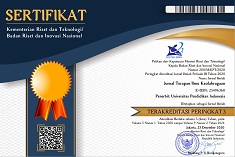The Role of Parenting Patterns on Children's Healthy Lifestyle: Authoritative, Authoritarian, and Permissive Types
Abstract
Keywords
Full Text:
PDFReferences
Anzman-Frasca, S., Newman, M. B., Angstrom, H. M., Sharma, S., Nelson, M. E., Dolan, P. R., & Economos, C. D. (2014). Parent Perspectives on Nutrition and Physical Activity During Out-of-School Time. Journal of Nutrition Education and Behavior. https://doi.org/10.1016/j.jneb.2013.09.011
Araújo, F. J. de O., de Lima, L. S. A., Cidade, P. I. M., Nobre, C. B., & Neto, M. L. R. (2020). Impact Of Sars-Cov-2 And Its Reverberation In Global Higher Education And Mental Health. In Psychiatry Research. https://doi.org/10.1016/j.psychres.2020.112977
Aslamiyah, Z. (2023). Parenting style but not intensity of gadget use is associated with social-emotional development among preschool children in surabaya. GSC Advanced Research and Reviews, 15(2), 013-019. https://doi.org/10.30574/gscarr.2023.15.2.0134
Awiszus, A., Koenig, M., & Vaisarova, J. (2022). Parenting styles and their effect on child development and outcome. Journal of Student Research, 11(3). https://doi.org/10.47611/jsrhs.v11i3.3679
Baumrind, D. (1967). Child care practices anteceding three patterns of preschool behavior. Genetic Psychology Monographs.
Baumrind, Diana. (2005). Patterns of parental authority and adolescent autonomy. New Directions for Child and Adolescent Development, 108, 61–69. https://doi.org/10.1002/cd.128
Bhutta, Z. A., Berkley, J. A., Bandsma, R. H. J., Kerac, M., Trehan, I., & Briend, A. (2017). Severe childhood malnutrition. In Nature reviews. Disease primers. https://doi.org/10.1038/nrdp.2017.67
Burusic, J., Sakic, M., & Koprtla, N. (2014). Parental perceptions of adolescent health behaviours: Experiences from Croatian high schools. Health Education Journal. https://doi.org/10.1177/0017896912471522
Chabra, S. and Dutta, I. (2016). Influence of mother’s parenting styles on mental health of adolescents: interplay of gender. Mier Journal of Educational Studies Trends & Practices, 234-248. https://doi.org/10.52634/mier/2013/v3/i2/1549
CNN Indonesia. (2022). Hati-hati, Omicron BA.4 dan BA.5 Bisa Menyerang Anak-anak. Accessed December 3, 2022. https://www.cnnindonesia.com/gaya-hidup/20220622063231-255-811948/hati-hati-omicron-ba4-dan-ba5-bisa-menyerang-anak-anak
Davids, E. L., Roman, N. V., & Leach, L. (2017). The link between parenting approaches and health behavior: A systematic review. Journal of Human Behavior in the Social Environment, 27(6), 589–608. https://doi.org/10.1080/10911359.2017.1311816
Derguy, C., Poumeyreau, M., Pingault, S., & M’bailara, K. (2018). A therapeutic education program for parents of children with ASD: Preliminary results about the effectiveness of the ETAP program. Encephale. https://doi.org/10.1016/j.encep.2017.07.004
Fadlillah, M., Wahab, R., Ayriza, Y., & Indartono, S. (2020). The roles of parenting style towards mental health of early childhood. Medico-Legal Update. https://doi.org/10.37506/mlu.v20i2.1189
Gao, Y., Zhang, W., & Fung, A. L. C. (2015). The associations between parenting styles and proactive and reactive aggression in Hong Kong children and adolescents. International Journal of Psychology. https://doi.org/10.1002/ijop.12104
Hampshire, A. (2020). Youth poverty in COVID-19 Australia. Committee for Economic Development of Australia.
J., B., M., S., & N., K. (2014). Parental perceptions of adolescent health behaviours: Experiences from Croatian high schools. In Health Education Journal.
KBBI. (2020). Kamus Versi Online. https://kbbi.web.id/ Accessed December 4, 2022.
Kemenkes RI. (2018). Hidup Sehat. http://promkes.kemkes.go.id/hidup-sehat Accessed December 3, 2022.
Kohn, A. (2005). Unconditional teaching. In Educational Leadership.
Martinez-Escudero, J., Villarejo, S., Garcia, O., & García, F. (2020). Parental socialization and its impact across the lifespan. Behavioral Sciences, 10(6), 101. https://doi.org/10.3390/bs10060101
Rhodes, R. E., & Kates, A. (2015). Can the Affective Response to Exercise Predict Future Motives and Physical Activity Behavior? A Systematic Review of Published Evidence. Annals of Behavioral Medicine. https://doi.org/10.1007/s12160-015-9704-5
Scaglioni, S., De Cosmi, V., Ciappolino, V., Parazzini, F., Brambilla, P., & Agostoni, C. (2018). Factors influencing children’s eating behaviours. In Nutrients. https://doi.org/10.3390/nu10060706
Sleddens, E., Gerards, S., Thijs, C., Vries, N., & Kremers, S. (2011). General parenting, childhood overweight and obesity-inducing behaviors: a review. International Journal of Pediatric Obesity, 6(2-2), e12-e27. https://doi.org/10.3109/17477166.2011.566339
Van Der Horst, K., & Sleddens, E. F. C. (2017). Parenting styles, feeding styles and foodrelated parenting practices in relation to toddlers’ eating styles: A cluster-analytic approach. PLoS ONE. https://doi.org/10.1371/journal.pone.0178149
Van Rinsum, C., Gerards, S., Rutten, G., Johannesma, M., Van De Goor, I., & Kremers, S. (2019). The implementation of the coaching on lifestyle (CooL) intervention: Lessons learnt. BMC Health Services Research. https://doi.org/10.1186/s12913-019-4457-7
Wang, L. (2024). Parenting style and child mental health at preschool age: evidence from rural china. BMC Psychiatry, 24(1). https://doi.org/10.1186/s12888-024-05707-1
Who. (2010). Global recommendations on physical activity for health. Geneva: World Health Organization. https://doi.org/10.1080/11026480410034349.
DOI: https://doi.org/10.17509/jtikor.v9i1.81912
Refbacks
- There are currently no refbacks.
Copyright (c) 2025 Muhamad Hanif Ramadhan, Tian Kurniawan, Aditya Rani Ditya Candra

This work is licensed under a Creative Commons Attribution-NonCommercial-ShareAlike 4.0 International License.





